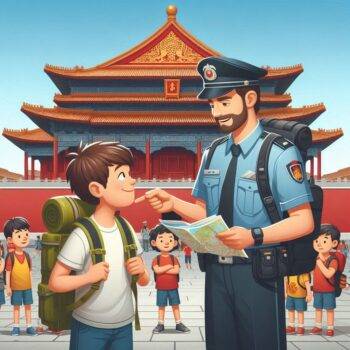
Navigating emergencies in a foreign country can be daunting, but being prepared can make all the difference. Whether you’re living in China or just visiting, understanding how to handle various emergencies is crucial for your safety and peace of mind. This guide provides practical advice, essential resources, and actionable steps to help you deal with emergencies as a foreigner in China.
Emergency Contact Numbers
Knowing the local emergency contact numbers is the first step in being prepared. Save these numbers in your phone and keep them easily accessible:
- Police: 110
- Fire Department: 119
- Ambulance: 120
- Traffic Accidents: 122
For non-emergency assistance, you can also contact your country’s embassy or consulate. Find your embassy here.
Medical Emergencies
Healthcare in China varies widely between urban and rural areas, so it’s important to know where to go and what to do in case of a medical emergency.
Steps to Take in a Medical Emergency:
- Call 120: This will connect you to the ambulance service. Be prepared to provide your location and details of the emergency. If you don’t speak Mandarin, use a translation app like Google Translate or Pleco.
- Foreign-Friendly Hospitals: Identify hospitals in your area that cater to foreigners. These hospitals often have English-speaking staff and higher standards of care. Examples include:
- Beijing: Beijing United Family Hospital
- Shanghai: Shanghai East International Medical Center
- Guangzhou: Clifford Hospital
- Health Insurance: Ensure you have comprehensive health insurance that covers medical emergencies in China. Carry a copy of your insurance policy and contact information for your provider.
- Medical Kit: Keep a basic medical kit with essential items such as pain relievers, bandages, antiseptics, and any personal medications you may need.
Tip: Download the Ping An Good Doctor app for online medical consultations.
Natural Disasters
China is prone to various natural disasters, including earthquakes, typhoons, and floods.
Being prepared can save lives.
Earthquakes:
- Stay Calm: Drop to the ground, take cover under sturdy furniture, and hold on until the shaking stops.
- Emergency Kit: Keep an emergency kit with water, non-perishable food, flashlight, batteries, and first aid supplies.
- Evacuation Plan: Know the evacuation routes and safe areas in your building or neighborhood.
Typhoons:
- Stay Indoors: Secure windows and doors, and avoid going outside during the storm.
- Emergency Kit: Ensure you have supplies to last a few days, including water, food, and a power bank.
- Stay Informed: Follow weather updates and warnings from local authorities. Use apps like AccuWeather or China Weather.
Floods:
- Move to Higher Ground: If flooding occurs, move to higher ground immediately.
- Avoid Floodwaters: Do not walk or drive through floodwaters, as they can be dangerous.
- Stay Informed: Keep updated with local news and follow instructions from authorities.
Tip: Check the China Earthquake Networks Center for real-time updates on seismic activity.
Personal Safety
Personal safety is paramount, especially in unfamiliar environments.
Theft and Crime:
- Stay Vigilant: Be aware of your surroundings and keep an eye on your belongings, especially in crowded areas like markets or public transport.
- Secure Your Valuables: Use hotel safes or secure storage for valuables. Avoid displaying expensive items like jewelry or electronics.
- Emergency Contact: Have a local emergency contact who can assist you in case of theft or other crimes.
Legal Emergencies:
- Know Your Rights: Familiarize yourself with local laws and regulations to avoid legal issues. For example, drug offenses are severely punished in China.
- Legal Aid: If you face legal troubles, contact your embassy or consulate immediately. They can provide legal advice and resources. Find your embassy here.
Communication During Emergencies
Effective communication is crucial during emergencies, especially if you don’t speak the local language.
Local Language:
- Learn Basic Phrases: Knowing basic Mandarin phrases related to emergencies can be helpful. For example:
- “Help!”: 救命 (jiù mìng)
- “I need a doctor”: 我需要医生 (wǒ xū yào yī shēng)
- “Call the police”: 报警 (bào jǐng)
- Translation Apps: Use apps like Google Translate or Pleco to communicate with locals.
Embassy and Consulate:
- Register with Your Embassy: Inform your embassy or consulate about your stay in China. They can provide assistance during emergencies and keep you informed about safety updates.
- Contact Information: Keep the contact information of your embassy or consulate handy. For example:
Transportation Emergencies
Navigating transportation emergencies requires knowing your options and having contingency plans.
Public Transportation:
- Know the Routes: Familiarize yourself with the local public transportation system, including bus and subway routes.
- Emergency Exits: Be aware of emergency exits and procedures in public transportation facilities.
Taxis and Ride-Hailing:
- Reliable Services: Use reputable taxi services or ride-hailing apps like DiDi for safe transportation.
- Driver Identification: Ensure the driver matches the details provided by the app to avoid scams.
Travel Insurance:
- Comprehensive Coverage: Have travel insurance that covers transportation emergencies, including accidents and cancellations. Providers like World Nomads or Allianz Travel Insurance are good options.
Mental Health Support
Emergencies can be stressful, and it’s important to take care of your mental health.
- Stay Calm: Practice deep breathing or mindfulness techniques to stay calm during emergencies.
- Support Networks: Reach out to expat communities or friends for emotional support. Platforms like Internations can help you connect with others.
- Counseling Services: If needed, seek professional help. Some international hospitals in China offer mental health services.
Conclusion
Dealing with emergencies as a foreigner in China requires preparation, awareness, and access to resources.
By understanding local emergency procedures, having essential contact information, and being equipped with emergency kits, you can navigate crises with confidence.
Key Takeaways:
- Save emergency contact numbers and embassy details.
- Identify foreign-friendly hospitals and ensure you have health insurance.
- Prepare for natural disasters with emergency kits and evacuation plans.
- Use technology like translation apps and ride-hailing services to stay safe.
For more resources, visit:
Stay safe and prepared during your time in China!



